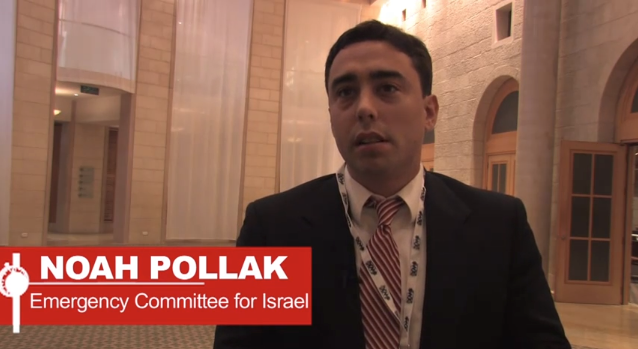by Eli Clifton & Jim Lobe
The Emergency Committee for Israel (ECI) is having a rough six months. Last year, ECI and its chairman, Republican operative Bill Kristol, did all it could to portray Barack Obama as insufficiently supportive of Israel. The group’s efforts and considerable spending on television ad-buys did little to sway Jewish voters, 69% of whom voted for Obama.
Hot off their election losses, the group then sunk several hundred thousand dollars into a campaign to derail Obama’s nomination of former Sen. Chuck Hagel (R-NE) to head up the Pentagon. The campaign failed, and Hagel, despite being labeled “not a responsible option” in full-page newspaper ads bought by ECI, was sworn in as Secretary of Defense at the end of February.
Having thus shown themselves to be at best in the mainstream of an increasingly extremist and partisan Republican Party and lacking a scintilla of evidence that they represent the views of a majority of Jewish Americans, the group today took issue with a letter from the Israel Policy Forum (IPF), signed by 100 prominent Jewish Americans, calling on Israeli Prime Minister Benjamin Netanyahu to “work closely with Secretary of State John Kerry to devise pragmatic initiatives, consistent with Israel’s security needs, which would represent Israel’s readiness to make painful territorial sacrifices for the sake of peace.”
Signatories included well-known donors to Jewish and Israeli charities and foundations, such as Charles Bronfman, Danny Abraham, Lester Crown, and Stanley Gold; former U.S. Defense Undersecretary Dov Zakheim; former Rep. Mel Levine, former AIPAC executive director Tom Dine; Holocaust scholar Deborah Lipstadt; the current and immediate past presidents of United Reform Judaism; Atlanta Hawks owner Bruce Levenson; the former chairman of of the United Jewish Appeal, Marvin Lender; former chairman of the Jewish Agency, Richard Pearlstone; and the director of the influential Religious Action Center of Reform Judaism, Rabbi David Saperstein, among others.
The ECI blasted the IPF in its own letter to Netanyahu, which was signed by its three board members — Kristol, Gary Bauer, and “Bad Rachel” Abrams — its executive director, Noah Pollak, and “adviser” Michael Goldfarb. The five signatories assured the Israeli leader that the IPF signatories — whom they call “oracles of bad advice” — “don’t speak for us or for a majority of Americans.”
We not only question the wisdom of their advice, we question their standing to issue such an admonition to a democratically-elected (sic) prime minister whose job is not to assuage the political longings of 100 American Jews, but to represent — and ensure the security of — the Israeli people.
The ECI letter goes on to assure Netanyahu that its five signers “affirm the words of Israel’s ambassador to the United States, Michael Oren, who recently asked an American Jewish audience to ‘respect the decisions made by the world’s most resilient democracy.’”
“We, too, have strong opinions on the peace process — but one thing we never presume to do is instruct our friends in Israel on the level of danger to which they should expose themselves.”
The letter concludes:
We trust, of course, that you are under no misapprehensions about any of this. But we felt it important that you heard from a mainstream voice in addition to the predictable calls from a certain cast of American activists for more Israeli concessions.
Indeed, there is little to reason to doubt that ECI’s board members, one of whom called on Palestinians to be thrown into the sea “to float there, food for sharks, stargazers and whatever other oceanic carnivores God has put there for the purpose,” have “strong opinions about the peace process” or that they are strong supporters of Netanyahu (although, as individuals, they have offered no end of advice to other Israeli Prime Ministers, such as Ehud Olmert.)
But, as their short list of signatures suggests, US Jews, in any event, don’t agree with ECI’s extremist views.
The American Jewish Committee’s 2012 poll of Jewish public opinion found only 4.5% of Jewish voters listed US-Israel relations as their most important issue in November’s 2012 presidential election. A November 6, 2012 J Street poll found that 73% of Jewish voters agreed with Obama’s President’s policies in the Arab-Israeli conflict, while 76% supported the US playing an active role in resolving the Arab-Israeli conflict “if it meant the United States putting forth a peace plan that proposes borders and security arrangements between Israelis and Palestinians.”
Such an agreement may well run afoul of Oren’s directive that Jewish Americans “respect” Israel’s decisions or ECI’s suggestion that it is inappropriate for American Jews “to demand ‘painful territorial sacrifices’ of Israelis.”
Thus, it seems safe to conclude that the views of IPF’s signatories are much closer to those of most US Jews than to ECI’s and its five signatories.
As for ECI’s claim that it speaks for “a majority of Americans,” that, too, seems in question. Nearly two-thirds of respondents (65%) in the latest of the Chicago Council on Global Affairs’s quadrennial series of surveys, released last September, said they believed that Washington should not side with either party in negotiations betweenIsrael and the Palestinians. That finding was broadly consistent with previous polling on the same or similar questions over many years.





